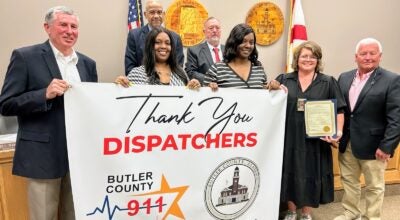OPINION: Crenshaw needs to adopt better habits
Published 9:45 am Thursday, April 16, 2015
The Alabama Cooperative Extension at Auburn University and the Centers for Disease Control and Prevention have formed a coalition that should prove to be a real asset to Crenshaw County.
The coalition is called ALProHealth Community Coalition. ALProHealth stands for Alabama Preventing and Reducing Obesity: Helping to Engage Alabamians for Long-term Health.
The coalition will take a three-pronged approach to tackling the county’s obesity rate by offering nutrition education, improving healthy food choices through food retailers and improving opportunities for physical activity.
According to a 2012 study, more than 40 percent of adults in Crenshaw County are obese. The county is one of only 14 counties in the state with that distinction. But, those numbers are going to change.
The three-year project is the perfect opportunity for all of us to form life changes and a community that values health and nutrition as much as it does pageants and football.
Support for a healthier Crenshaw County will come from other sources, too. Last week, Alabama Senate Majority Leader Greg Reed announced legislation that will create the Alabama Healthy Food Financing Act to help bring healthier food options closer to home for nearly half a million children across the state.
VOICES for Alabama’s Children, the American Heart Association, the Robert Wood Johnson Foundation and The Food Trust have partnered with organizations from the public, private and philanthropic sectors in Alabama to support a statewide Healthy Food Financing Initiative. HFFIs are a proven policy solution to a problem that plagues urban and rural communities throughout the country.
Such initiatives encourage grocery store expansion and development in areas of need, which can bring long-term health and economic benefits.
VOICES for Alabama’s Children and The Food Trust also released a comprehensive mapping report, Food for Every Child: The Need for Healthy Food Financing in Alabama.
The report, available online www.alavoices.org/healthy_food_access, uses a series of maps to show the connection between the lack of access to fresh, healthy food in Alabama and negative health outcomes.
For example, Alabama is the nation’s fifth most obese state. Thirty-five percent of the state’s children are considered to be overweight and nearly one in five Alabama children aged 10-17 are obese.
It is no surprise that 20 percent of Alabama’s children are obese, especially in our county where adults are twice as likely to be overweight.
The Food for Every Child report showed how the shortage of healthy food retail means that Alabamians must travel out of their neighborhoods to reach the nearest store selling fresh produce and other foods necessary to maintain a healthy diet.
Those who do not spend the time, money and energy to seek healthier food options end up spending more time, money and energy on health care.
Economists estimate that Alabama could save approximately $3.38 billion in obesity-related health care costs by 2020 if the state could reduce obesity by five percent.
The report also details the benefits of a collaborative relationship between the grocery industry, economic development, and health sectors to stimulate food retail development in areas of need. It shows that one critical component of an HFFI is its ability to increase the distribution of agricultural products, develop and equip grocery stores, and strengthen producer-to-consumer relationships.
Establishing and nurturing these critical relationships will help address the diverse needs of children and families throughout the state and provide growth opportunities for a wide range of businesses.
A recent statewide poll commissioned by VOICES for Alabama’s Children shows overwhelming support from Alabama voters to address the healthy food access issue.
Eighty percent of people polled expressed support for providing incentives to food retail businesses that locate in communities with limited access to healthy foods, and more than 100 organizations across the state have joined the effort to start an HFFI in Alabama.
There is a place in this initiative for each and every one of us to get involved or show support. I look forward to seeing a thinner, healthier Crenshaw County and to the fun, creative ways this community will choose to reach that goal.





